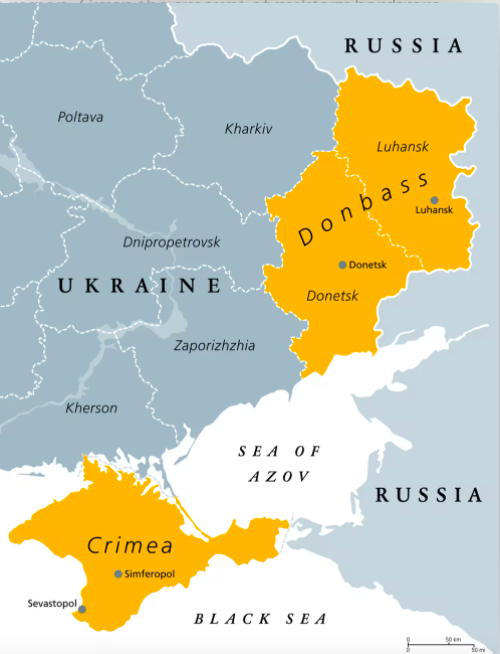
Settling Ukraine: The Need for a Diplomatic Solution Between Russia and the United States
On December 7th, a 2-hour virtual summit between President Joe Biden of the United States and President Vladimir Putin of the Russian Federation was held on the subject of Ukraine. The summit, which came amid the backdrop of alarming intelligence reports of a 100,000-175,000 Russian troop buildup near Ukraine and fears of a Russian invasion of the rest of Ukraine, achieved no diplomatic breakthrough. Following the conclusion of the summit, Victoria Nuland, Biden’s Undersecretary of State for Political Affairs, repeated previous threats of severe economic sanctions should Russia invade. Russia, for its part, denies that it has any intention to invade Ukraine and blames the crisis on the West pushing Ukraine to join the North Atlantic Treaty Organization (NATO) and renege on its commitments in the 2014-2015 Minsk Protocols. The Minsk Protocols were the agreements signed by all sides to stabilize the Ukrainian situation in the wake of the instability unleashed in the 2014 Maiden Revolution that ousted a duly elected pro-Russian president from Ukraine. Since 2014, Ukraine has been through a series of war scares. In April of 2021 reports of Russia amassing 100,000 soldiers to invade Ukraine created a similar war scare that touched off an international crisis only for it to come to naught. In June, an international incident occurred again when a British warship was caught sailing close to the Russian controlled coast of Crimea in a show of solitary with Ukraine.
This crisis over Ukraine has brought various outstanding issues to the fore. Ukraine’s various bids for NATO membership to the Russians represent an unacceptable threat of having yet another bordering country that has traditionally been under their sphere of influence becoming aligned with anti-Russian powers. Russia often claims that promises were made to it prior to the end of the Cold War that NATO would not expand. NATO itself claims that there is no record of such a promise made by it. While there may be no organizational record of such an understanding, there are records of major NATO countries (the United States included) assuring the Soviets that NATO would not expand eastward. Obviously, after the end of the Cold War, these assurances were broken by NATO incorporating countries that were former members of the Warsaw Pact and former republics of the Soviet Union into the fold.
When Russia intervened in 2014, it further defended its decision as reacting to Ukraine’s hostile policy toward its Russian minority. The Russian minority in Ukraine have been subject to various laws that demote the use of Russian in official institutions like education and in the media. (Incidentally, the Ukrainian language was historically also subjected to hostile policies going back to the days of Czarist Russia.) Prior to the 2014 Revolution, President Yanukovyck attempted to address this issue by allowing localities to pass legislation that determined what their official languages were. However, since the Revolution the hostility toward the Russian language has intensified. When Russia intervened in the aftermath of the Revolution, this action was popular among the Russian Ukrainians who welcomed a return to the motherland.
What the Ukrainian government seeks to do is regain control over the entirety of the territory they controlled prior to the 2014 Revolution. Since the 2014 Revolution, which sparked the pro-Russian eastern portion of Ukraine to secede from the country or, as in the case of Crimea, to be annexed to Russia itself, it has ceased to have complete sovereignty in its own land. Ukraine refuses to recognize Russian control over Crimea as Ukraine has legal title to Crimea ever since this territory was gifted to Ukraine by the Soviet Union in 1954. Russian intervention in Ukraine further directly violates the 1994 Budapest Memorandum where it (in addition to the US and Great Britain) agreed “to respect the independence and sovereignty and the existing borders of Ukraine” in exchange for Ukraine transferring the nuclear arsenal that the Soviet Union stationed there to Russia. The Russians, disingenuously insist that they have not violated this memorandum as they claim it only prevented them from discharging their nuclear weapons on Ukraine and not on intervening in Ukraine using conventional weapons. More plausibly, however, the Russians claim that since the 2014 Maiden Revolution overthrew the legitimate democratically elected government, the memorandum does not apply to the post-revolutionary government.
All the outstanding issues ranging from Western broken promises regarding NATO, the question of Ukrainian sovereignty over its territories, and the language issue over the use of Russian in Ukraine have contributed toward Ukraine being a very potent geopolitical hotspot of tension between the great powers. The fact that domestic tensions over, among other things, language rights has touched off several war scares between not just Russia and Ukraine but between Russia and the West shows just how unstable the situation is. The various crises over Ukraine have already deepened Russian-Chinese cooperation since both countries have found themselves at opposite ends with the US. It is no surprise then that a virtual meeting between Putin and Xi, the leader of China, was scheduled for December 15th - a mere few days after Putin’s call with Biden. A diplomatic resolution of Ukraine is needed both to avoid a general war and to resolve the fundamental tension between Russia, the United States, and its European allies over the West’s eastward expansion of its sphere of influence. A NATO that swallows up yet another country that borders Russia is to the Russians a clearly provocative act. Similarly, a full-on Russian invasion of Ukraine would be extremely worrisome to the West.
In this increasingly multipolar world, there is an American interest in seeing if it is able to build a détente with Russia and decouple them from China. History may yet borne out again the veracity of Bismarck’s quip that the secret of good politics is to make a good treaty with Russia. To do this, Russia and the West must build up mutual trust by coming to a basic understanding that is respected in order for the Russians to consider competing for influence in Central Asia where China is trying to expand its sphere of influence in areas that once were also under Soviet control. An agreement over Ukraine will not magically do this all on its own but it will be a serious step. The best framework to do this is by making Ukraine a devolved federal union with stronger minority protections that is prohibited from joining military alliances with either Russia or the United States (such as in the form of NATO). While it is doubtful that Russia will give up Crimea, which it has already annexed, an attempt should be made to sweeten the offer for the Ukrainians by Russia returning the Donbass region in eastern Ukraine to Kiev’s control. This general offer should be tempting to the Russians as it roughly conforms to what they themselves have stated to be the future they want for Ukraine. Whether upheld or violated such a hypothetical treaty would at the very least make the intentions of all parties clearer. If Russia should violate it then the West now has evidence that the Russians care more about their own territorial expansion, than any real desire to reach an understanding with the West. If the West would violate it then Russia will have evidence that Western policy is so hostile to Russia that even when things are committed to paper the West cannot be trusted.
